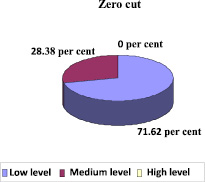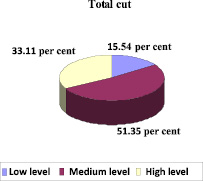The article is the research of humanitarian orientation of the personality of university students of technical specialties, who are the carriers of their country’s culture. Culture influences the formation of man’s personal qualities and behaviour. The study of the uniqueness of culture of the South Ural will allow to understand valuable orientations and senses of the students who are trained here – humanitarian orientation of their personality. On the basis of the South Ural’s culture the education of schoolchildren and students, including of technical specialties, is built. Formed humanitarian orientation conducts the knowledge of the person himself, ability to cooperate and work in team. Article gives poll data of students about sense and meaning of their life and main positive qualities of people for them. The presented diagrams reflect results of the pedagogical experiment on formation of the humanitarian orientation of the personality of university students of technical specialties. There is also the characteristic of changes in the personality of students of experimental group as a result of approbation of the developed system on formation of the humanitarian orientation of the personality and the carefully picked up complex of pedagogical conditions.
Introduction
Culture is the indicator of the development of society during its different historical periods, because it includes values, which characterize society at each stage of its development. It is the experience of mankind saved up and transferred from one generation of people to another during the process of life activity. The carrier of culture is the personality, which keeps in itself norms and values, accepted in the society and checked for centuries.
Russian culture is the all-human, open and deprived of the concept of the absolute evil; it provides the human attitude towards the representatives of other cultures and people, and to carriers of Russian culture – high flexibility and ability to cause to itself long-term sympathy. Culture forms the person and his personal qualities purposefully, «culture is practical realization of universal and spiritual values» [1, p. 66].
The personal beginning is formed via mechanisms of choice of this or that type of behaviour, values and senses. Youthful age is a sensitive period for formation of the valuable and sense sphere [3]; this age coincides with choice of profession and training at the university. This is the time of formation of future highly qualified specialist and leader, who possesses not only high level of intellect, but formed life-sense orientations, high level of self-actualization [4], personally significant characteristics and reflexivity. All this characterizes the humanitarian orientation of the future specialist of technical profile, his/her ability to work in team, direct people, resolve conflicts and disputes, understand people.
We understand the organizing property of the personality formed by means of education and training as a humanitarian orientation of the personality, developing the superior human qualities, having as its substantial side life-sense orientations and providing high level of manifestation of professional competence.
Achievement of integrity of knowledge of the person, society and nature, understanding of meaning of universal values in the modern world, understanding the place in the world, development of cultural consciousness, abilities and opportunities to reforming cultural activity are important for any young people including the university students of technical specialties as carriers of culture of Russia.
Culture and history of the South Ural is the culture and history of all peoples who have been living on its territory from ancient times. Ethnographers note ethnic complexity, heterogeneity of the structure of the population of the South Ural. All people settled here in different time, contributed to its culture. There are representatives of more than 100 nationalities living in the South Ural: Russians (majority), Tatars, Bashkirs, Ukrainians, Kazakhs, Germans, Belarusians, Mordvins, Nagaibaks, Chuvashs, Gypsies, Jews, Maris, Udmurts, Moldavians, Georgians, Kyrgyz, Armenians, Tadjiks, Azerbaijanians, Uzbeks, Poles, Koreans, Bulgarians, Chechens, Greeks, Lezghians, Turks, Vietnamese, Ossetins, Avars, Lithuanians, Estonians, Komi-Permyaks, Dargins and other nationalities.
The contribution of Ural to the culture of Russia, on which the basis of education of schoolchildren and students is built, is original [2]. The base of arts and crafts of Ural is industry namely Ural stone-cutting art, marble processing, production of various pig-iron household goods, iron casting in the architecture and industry. Kasli and Kusa iron casting and Zlatoust engraving on steel are widely known in Russia and abroad.
Keen interest in semi-precious stones caused development of stone-cutting, including jeweler art. Special pride of the southern Ural masters is stone panels, created by the artists of this region by means of the paints prepared from semiprecious stones.
Such writers and poets of the South Ural as Mikhail Lvov, Lyudmila Tatyanicheva, Yuri Libedinsky, Lidia Seyfullina, Konstantin Skvortsov, Anatoly Klimov, Anatoly Dementiev created novels, poems, drama works written with love to the native land – its nature, people of special character, mighty industry and culture.
All schoolchildren of the South Ural know tales (skazi) by Pavel Bazhov, whose work is connected with our region: «Malachite casket», «Stone flower», «Mountain master», «Copper mountain hostess» and others. Telling about the art of Ural handymen, reflecting beauty and originality of old mountain-factory life, Bazhov also brings up subjects of work, creative searches, love, fidelity, freedom from the power of gold and others, that is of true moral, spiritual beauty, values of the person.
Poll carried out by us, in which 115 first- and second-year students of technical specialties of the branch of SUSU in mountain-factory region in town Asha took part, showed that the most important values of the person for them are honesty (46,09 per cent), kindness (37,39 per cent), sincerity (15,65 per cent), respect for people (10,43 per cent) and mind (8,7 per cent). Also there were such answers as devotion, openness, sense of humour, decency, sociability etc. Only 4,35 per cent consider important the ability to help other people, 3,48 per cent – ability to listen, 3,48 per cent – responsibility, 2,61 per cent – diligence, 1,74 per cent – reliability, but after all these values of the person define him as a specialist who can work in a team. The sense of life for students is family creation (23,48 per cent), education (22,61 per cent), finding work with good salary (18,26 per cent) and statement and achievement of the objectives (16,52 per cent). Only 1,74 per cent of all respondents named health of parents, 2,61 per cent – to give happiness and good to other people, 1,74 per cent – to have friends, significant for them; 23,48 per cent don’t think of sense and value of their lives.
Thus, modern students are concerned, first of all, about personal wellbeing; public interests aren’t priority for them, which is a consequence of social changes in society. Material values, the cult of money replace true values with false ones, lead to violation of social norms and deviations in behaviour.
To avoid this it is necessary to form the humanitarian orientation of students’ personality at lessons of humanitarian disciplines, because technical disciplines don’t bring up universal questions of sense of life, the good and evil, love and hatred, the attitude towards other people. The special role is given to the humanitarian environment of the university, which includes art exhibition hall, where the exhibitions of famous artists constantly take place. In the assembly hall concerts of the well-known musicians take place. The virtual library offers walks in the Tretyakov art gallery, the Hermitage, the Pushkin museum which is very valuable in education of students of all specialties.
The pedagogical experiment carried out by us, the developed system, which can be used in the education and pedagogical correction of the personality of students of any specialties and also students of secondary vocational schools and schoolchildren, and carefully selected pedagogical conditions of its effective functioning allowed to raise the level of the humanitarian orientation of the personality (HOP) of students of technical specialties considerably within the discipline «The Foreign Language» (fig. 1, 2).

Fig. 1. Percentage ratio of number of respondents with low, medium and high level of HOP on zero cut

Fig. 2. Percentage ratio of number of respondents with low, medium and high level of HOP on total cut
In the group where the system was used entirely against all pedagogical conditions, the students became more emotional, sensitive; imagination, esthetic taste and intuition began to develop at them more dynamically. They became more conscious and capable to self-analysis. Students learned to perceive new information easier, to criticize old, become obsolete, and to aspire to experiment; they became more intense, diligent, and increased desire to make the task better, in comparison with results on the beginning of the experiment. Students of this group learned to realize more distinctly the purposes of the future which give their lives intelligence, orientation and temporary prospect more distinctly; they became more internal, responsible and socially mature. Their level of understanding themselves and ability to argue the point of view rose. The students began to reflex their acts and relations better. In other experimental groups where the system was used taking into account any one pedagogical condition, such essential changes were not revealed. In the control group where the purposeful formation of the humanitarian orientation of the personality of students of technical specialties was not occurred, on the contrary, there is dynamics to decrease in level of reflexivity and humanitarian orientation.
So, we can conclude that only professional-technical education doesn’t lead to formation of life-sense orientations, personal maturity and self-actualization; without purposeful development of humanitarian orientation, which includes development of cultural values of the people, understanding the sense of own life, the students of technical specialties generally displayed themselves as external persons; they don’t realize their potential and think a little about sense of life, that, in turn, can lead to decrease in the level of their culture.
The work is submitted to the International Scientific Conference «Cultural heritage of russia and the modern world», London, October, 19-26, 2013, came to the editorial office оn 09.10.2013.

